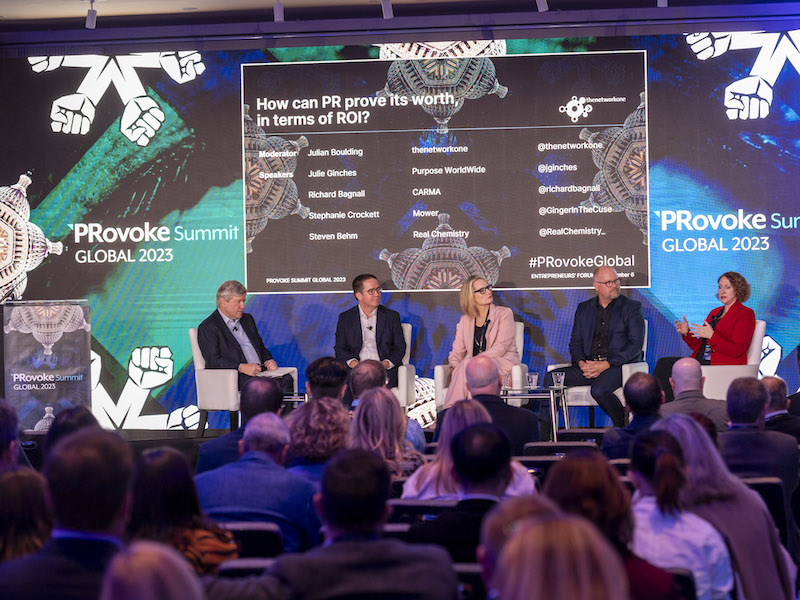Maja Pawinska Sims 06 Nov 2023 // 11:20PM GMT

WASHINGTON, DC — Leaders of independent PR agencies emphasised the critical role of measurement in navigating uncertain times ,in a discussion at the PRovokeGlobal summit this week.
Julian Boulding, president of Thenetworkone, said optimism was crucial to inspiring confidence in clients amid uncertainty. "We're asking clients to invest in something that we believe in, but can't guarantee. If we lack optimism, our clients will certainly follow suit," he said.
Boulding also addressed the broader challenges facing the industry, acknowledging mounting concerns over government, corporate and personal debt, as well as the impacts of climate change. He emphasised the importance of human creativity as the primary asset in PR, distinguishing it from AI.
"Human creativity is what we primarily sell. AI is about efficiency and probability and human creativity is about risk and possibility," he said. "We have to deal with the hard question of how we convince a client in a tough era that they should invest in comms without being able to prove a result, and how we prove and demonstrate the ROI from communications."
Stephanie Crockett, president and CEO of Mower, talked about the challenges facing independent agencies, particularly in the face of client apprehension. She pointed out that one in five CEOs is currently navigating a crisis, underscoring the need for preparedness and strategic planning.
"It's been challenging for the world of independent agencies. From the client perspective there's talk about fear; there are concerns that will impact ourselves and our clients," Crockett said. "Our jobs are going to get more difficult and we have to be prepared for that, but budgets are tight and a pre-plan is critical."
Steven Behm, practice lead for crisis communications and corporate reputation at Real Chemistry, was more positive about the evolving agency landscape, noting that the “perma-crisis” has shifted buyer expectations.
He said showcasing the value of PR lies not in simple metrics, but in demonstrating return on investment. "From my perspective it's never been a more exciting time to be on the agency side, because our buyer set has changed," he said. "When we think about showing the value of our work, it's about the programme of work showing ROI, and this has expanded the aperture of what PR can actually achieve."
Richard Bagnall, co-managing partner and CEO of Europe and Americas at Carma, said there was a surge in interest in measurement, but cautioned against focusing solely on activity metrics, highlighting the need for true value assessment. "There's never been more interest in measurement than there is now," he said.
"We need to measure the value of what we have done – and that's not just the activity. A tool that counts our activity isn't measuring value, especially when uncertainty is higher than it's ever been."
Helen Anderson, managing director of Thenetworkone, stressed the importance of understanding the client's perspective, particularly in justifying spend on PR: "Half the problem is that we don't put ourselves in the client's shoes enough," she said. "We're having to justify spend to people who don't understand the sector and have to constantly show CFOs the numbers. Measurement is crucial in the commissioning process, especially when budgets are squeezed."
Crockett reiterated the significance of aligning PR efforts with business objectives, emphasising the need to demonstrate tangible impact on sales. She acknowledged the challenge of connecting PR efforts with sales attribution, particularly in cases where client-side capabilities are limited: "The most important thing is understanding the business objectives," Crockett said. "We can ensure likes and impressions all day long, but if our work doesn't move the needle on sales it's not seen as having value."
Behm also emphasised the need to measure outcomes that drive meaningful business impact. "Clarity is critical - we need to make sure what we're measuring is going to have to have impact. It goes back to who is the buyer, what's the critical business need and how can PR drive the work that's needed for the business."
Bagnall identified predictive analytics as the ultimate goal for the industry and emphasised the complexity of human behaviour and the need for comprehensive value assessment beyond surface-level measurements. "Predictive analytics is the holy grail," he said. "We're taking a flawed approach – we're dealing with humans, and we're complex creatures. We need to measure beyond social media to get to value."


































.jpg)

















